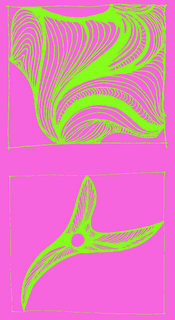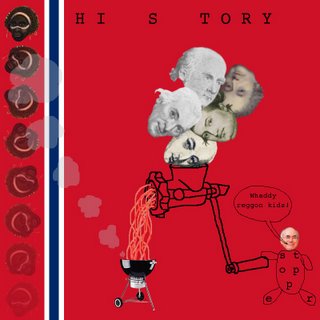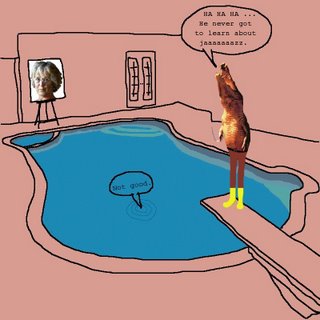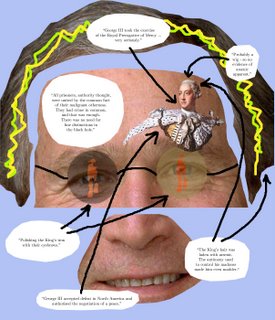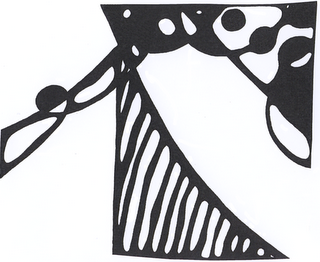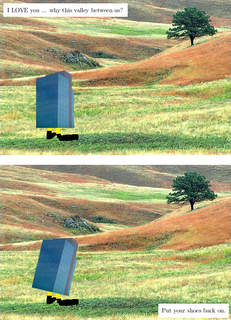Thursday, November 30, 2006
Creekside
I spied an old woman this morning sweeping and slicing her way through a Tai Chi routine. I smiled when I noticed a little Jack Russell terrier perched in front of her, carefully following the smooth and controlled movements of her arms. It would have made my day if, as I passed, the dog had traced a sympathetic paw through the air and nodded in my direction. We would have connected. All three of us.
Wednesday, November 29, 2006
Verse 3 of John Kinsella's Full Fathom Five
There he is. Hook it quick.
Full fathom five
dredged deep
the glory
of drowning
in a river
or taking to sea
and being dragged
back to shore.
The hook as sharp
as sight honed
by shamans,
the corpse a prismatic
reflection
of the living body.
Chaotic fish
dissect currents,
dislocate reefs,
and scatter sandbanks.
They will not be recruited
as pallbearers.
Full fathom five
dredged deep
the glory
of drowning
in a river
or taking to sea
and being dragged
back to shore.
The hook as sharp
as sight honed
by shamans,
the corpse a prismatic
reflection
of the living body.
Chaotic fish
dissect currents,
dislocate reefs,
and scatter sandbanks.
They will not be recruited
as pallbearers.
Tuesday, November 21, 2006
Now on tap in Pictland
My first reading of this ballad by Robert Louis Stevenson impressed me not because of its weighty themes of racial annihilation, sacrifice and secrecy but because of the absurd and counterproductive impulsiveness of the king in roughhousing his two little Pict brewster captives. If he truly wanted the formula for heather ale then he ought to have been much more cunning. He ought to have invited the stumpy couple back to his castle for dancing and feasting and tankard-clanging licentiousness. (After all that time cowering under a rock, I reckon they would have jumped at the offer of a knees-up.) Then, later in the night, when father and son were sufficiently liquefied, the king could have acted to extract the formula - by saying something tricky like "so, men, let us conclude this wild and vomitous evening with a quiet heather ale! What say? But wait! Oh dread and deary me, I must be snuffing too much toad, for we have no such lip-licking brew in this kingdom nor any knowledge of the manner of its brewing. Only you -- prone and cataleptic imps -- possess such lovely-lovely goodness. And so I ask (at the threat of sending everyone straight to bed): INSTRUCTIOWWWNAYS PLEASE".
It's a great ballad though.
Heather Ale: a Galloway Legend
From the bonny bells of heather
They brewed a drink long-syne,
Was sweeter far than honey,
Was stronger far than wine.
They brewed it and they drank it,
And lay in a blessed swound
For days and days together
In their dwellings underground.
There rose a king in Scotland,
A fell man to his foes,
He smote the Picts in battle,
He hunted them like roes.
Over miles of the red mountain
He hunted as they fled,
And strewed the dwarfish bodies
Of the dying and the dead.
Summer came in the country,
Red was the heather bell;
But the manner of the brewing
Was none alive to tell.
In graves that were like children’s
On many a mountain head,
The Brewsters of the Heather
Lay numbered with the dead.
The king in the red moorland
Rode on a summer’s day;
And the bees hummed, and the curlews
Cried beside the way.
The king rode, and was angry;
Black was his brow and pale,
To rule in a land of heather
And lack the Heather Ale.
It fortuned that his vassals,
Riding free on the heath,
Came on a stone that was fallen
And vermin hid beneath.
Rudely plucked from their hiding,
Never a word they spoke:
A son and his aged father—
Last of the dwarfish folk.
The king sat high on his charger,
He looked on the little men;
And the dwarfish and swarthy couple
Looked at the king again.
Down by the shore he had them;
And there on the giddy brink—
“I will give you life, ye vermin,
For the secret of the drink.”
There stood the son and father
And they looked high and low;
The heather was red around them,
The sea rumbled below.
And up and spoke the father,
Shrill was his voice to hear:
“I have a word in private,
A word for the royal ear.
“Life is dear to the aged,
And honor a little thing;
I would gladly sell the secret,”
Quoth the Pict to the King.
His voice was small as a sparrow’s,
And shrill and wonderful clear:
“I would gladly sell my secret,
Only my son I fear.
“For life is a little matter,
And death is nought to the young;
And I dare not sell my honor
Under the eye of my son.
Take him, O king, and bind him,
And cast him far in the deep;
And it ’s I will tell the secret
That I have sworn to keep.”
They took the son and bound him,
Neck and heels in a thong,
And a lad took him and swung him,
And flung him far and strong,
And the sea swallowed his body,
Like that of a child of ten;—
And there on the cliff stood the father,
Last of the dwarfish men.
“True was the word I told you:
Only my son I feared;
For I doubt the sapling courage
That goes without the beard.
But now in vain is the torture,
Fire shall never avail:
Here dies in my bosom
The secret of Heather Ale.”
It's a great ballad though.
Heather Ale: a Galloway Legend
From the bonny bells of heather
They brewed a drink long-syne,
Was sweeter far than honey,
Was stronger far than wine.
They brewed it and they drank it,
And lay in a blessed swound
For days and days together
In their dwellings underground.
There rose a king in Scotland,
A fell man to his foes,
He smote the Picts in battle,
He hunted them like roes.
Over miles of the red mountain
He hunted as they fled,
And strewed the dwarfish bodies
Of the dying and the dead.
Summer came in the country,
Red was the heather bell;
But the manner of the brewing
Was none alive to tell.
In graves that were like children’s
On many a mountain head,
The Brewsters of the Heather
Lay numbered with the dead.
The king in the red moorland
Rode on a summer’s day;
And the bees hummed, and the curlews
Cried beside the way.
The king rode, and was angry;
Black was his brow and pale,
To rule in a land of heather
And lack the Heather Ale.
It fortuned that his vassals,
Riding free on the heath,
Came on a stone that was fallen
And vermin hid beneath.
Rudely plucked from their hiding,
Never a word they spoke:
A son and his aged father—
Last of the dwarfish folk.
The king sat high on his charger,
He looked on the little men;
And the dwarfish and swarthy couple
Looked at the king again.
Down by the shore he had them;
And there on the giddy brink—
“I will give you life, ye vermin,
For the secret of the drink.”
There stood the son and father
And they looked high and low;
The heather was red around them,
The sea rumbled below.
And up and spoke the father,
Shrill was his voice to hear:
“I have a word in private,
A word for the royal ear.
“Life is dear to the aged,
And honor a little thing;
I would gladly sell the secret,”
Quoth the Pict to the King.
His voice was small as a sparrow’s,
And shrill and wonderful clear:
“I would gladly sell my secret,
Only my son I fear.
“For life is a little matter,
And death is nought to the young;
And I dare not sell my honor
Under the eye of my son.
Take him, O king, and bind him,
And cast him far in the deep;
And it ’s I will tell the secret
That I have sworn to keep.”
They took the son and bound him,
Neck and heels in a thong,
And a lad took him and swung him,
And flung him far and strong,
And the sea swallowed his body,
Like that of a child of ten;—
And there on the cliff stood the father,
Last of the dwarfish men.
“True was the word I told you:
Only my son I feared;
For I doubt the sapling courage
That goes without the beard.
But now in vain is the torture,
Fire shall never avail:
Here dies in my bosom
The secret of Heather Ale.”
Saturday, November 11, 2006
Alabama Caboose ...

... but it could have been Texan.
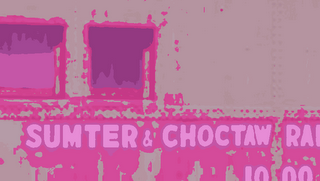
A South politician preaches to the poor white man,
"You got more than the blacks, don't complain.
You're better than them, you been born with white skin," they explain.
And the Negro's name
Is used it is plain
For the politician's gain
As he rises to fame
And the poor white remains
On the caboose of the train
But it ain't him to blame
He's only a pawn in their game.
(From Bob Dylan's Only a Pawn in Their Game.)
Saturday, October 21, 2006
Sunday, October 15, 2006
Friday, October 06, 2006
They're calling for you
A flatbed truck pulls away
With dust-swarmed wheels
No one moves
The funereal pall
Is spared interruption
Till it dissolves
But then
At the instant of ascension
And woven into sclerophyll
A flashing thread of cockatoos
Sounds a silent mustering of
Stoops and half-nods
People begin to move
Lighted by this day
Into another
With dust-swarmed wheels
No one moves
The funereal pall
Is spared interruption
Till it dissolves
But then
At the instant of ascension
And woven into sclerophyll
A flashing thread of cockatoos
Sounds a silent mustering of
Stoops and half-nods
People begin to move
Lighted by this day
Into another
Tuesday, October 03, 2006
A poem by Anthony Lawrence
The Queensland Lungfish
The Queensland lungfish I carried
like a sock full of mud
from the swamp is very sick.
It squelches and burps
like a sock full of mud.
Sometimes it smiles, sometimes
it squelches and burps.
I call it Fred.
Sometimes it smiles, sometimes
it stares straight ahead, even when
I call it Fred.
I think it's going to die.
It stares straight ahead, even when
I play my guitar loud.
I think it's going to die.
I offer it mosquitoes and maggots.
I play my guitar loud
for its entertainment.
I offer it mosquitoes and maggots
even though it doesn't like them.
For its entertainment
I make faces at the glass,
even though it doesn't like them.
I don't know what to do.
I make faces at the glass,
I say, Fred! Can you hear me?
I don't know what to do.
I should have left it in the swamp.
I say, Fred! Can you hear me?
But it doesn't move.
I should have left it in the swamp.
Are you going to die soon, Fred?
The Queensland lungfish I carried
like a sock full of mud
from the swamp is very sick.
It squelches and burps
like a sock full of mud.
Sometimes it smiles, sometimes
it squelches and burps.
I call it Fred.
Sometimes it smiles, sometimes
it stares straight ahead, even when
I call it Fred.
I think it's going to die.
It stares straight ahead, even when
I play my guitar loud.
I think it's going to die.
I offer it mosquitoes and maggots.
I play my guitar loud
for its entertainment.
I offer it mosquitoes and maggots
even though it doesn't like them.
For its entertainment
I make faces at the glass,
even though it doesn't like them.
I don't know what to do.
I make faces at the glass,
I say, Fred! Can you hear me?
I don't know what to do.
I should have left it in the swamp.
I say, Fred! Can you hear me?
But it doesn't move.
I should have left it in the swamp.
Are you going to die soon, Fred?
Friday, September 29, 2006
Cancer code
What a miracle is Stevie Ray Vaughan's version of Chitlins Con Carne! Makes corrupted intentions pass through the scanner with ease. (And desire, but that was an afterthought.)






Monday, September 25, 2006
Zedong's big mug
On the weekend I read about a group of Mao portraitists who every year re-touch a giant mural of the chairman in Tiananmen Square. More blush for the cheeks, more sheen for the chin wart, more sparkle for the ear fluff, etc. Their job is secret, their toil unrecognised (at least publicly). According to ex-Mao-muggist Wang Guodong, however, this does not mean the finer details of their artistry go unscrutinised. He was "shipped off to work as a carpenter in a framing factory" for "painting Mao at a slight tilt from the viewer that showed only one ear. The Red Guards said it implied the chairman listened to a select few rather than the masses". (My sympathies are with Mr Wang, obviously, but I have to say that shifting Mao's head around is going well beyond the "refreshment" JD, surely?)
And in news closer to home ...
I look forward, after next year's federal election, to standing awestruck before a mammoth portrait of chairman Ausmao or A Typical Aussie Battler On $200kpa hanging permanently on an inward-facing side of Westfield shopping centre's multi-story carpark. I also look forward to monitoring the subtle changes to Ausmao's visage as it is re-touched by wave after wave of graffiti banditti who couldn't give a fuck about mythology (or iconography) but know what they feel and feel like they're missing out.
And in news closer to home ...
I look forward, after next year's federal election, to standing awestruck before a mammoth portrait of chairman Ausmao or A Typical Aussie Battler On $200kpa hanging permanently on an inward-facing side of Westfield shopping centre's multi-story carpark. I also look forward to monitoring the subtle changes to Ausmao's visage as it is re-touched by wave after wave of graffiti banditti who couldn't give a fuck about mythology (or iconography) but know what they feel and feel like they're missing out.
Thursday, September 21, 2006
Us and them or just us
I don't usually read Richard Glover's column in the weekend Sydney Morning Herald*, but this one was dead set mickey mouse.
That is to say, it had a simple message about the foolishness (and dangerousness) of dishonouring, mocking and bullying Muslim Australians. Here's a snippet (that refers to the importance of cultural cooperation in the battle against violent extremism).
*I gave up once it's scope became clear: fluffy stereotype reinforcement featuring young well-adjusted mums and dads and their hilariously juxtaposed attitudes to white goods, sheds, sports days and who makes the salad / who sets up the tent on family holidays.
That is to say, it had a simple message about the foolishness (and dangerousness) of dishonouring, mocking and bullying Muslim Australians. Here's a snippet (that refers to the importance of cultural cooperation in the battle against violent extremism).
It's a radical proposal, I know, but let me say it out loud: maybe we should stop putting so much effort into marginalising people whose goodwill we so keenly need.
*I gave up once it's scope became clear: fluffy stereotype reinforcement featuring young well-adjusted mums and dads and their hilariously juxtaposed attitudes to white goods, sheds, sports days and who makes the salad / who sets up the tent on family holidays.
Wednesday, September 20, 2006
Laurence Binyon - global warming seer

They will come again, the leaf and the flower, to arise
From squalor of rottenness into the old splendour,
And magical scents to a wondering memory bring;
The same glory, to shine upon different eyes.
Earth cares for her own ruins, naught for ours.
Nothing is certain, only the certain spring.
(A verse from The Burning of the Leaves (1942))
What are the earth's ruins that aren't also ours, I wonder? One of my vaguely spiritual fantasies -- the kind that percolates through my id when I'm watching question time in the Senate -- is that the earth will be bumped by a wayward comet into a new orbit much closer to the sun. To the extent that pontiffs*, plutocrats, peasants and property developers alike will cook in the same cauldron that is oblivion, this will amount to an apocalypse. But also a renewal, because it just may be that, over time, new primitive organisations emerge and begin to arrange themselves in one of those self-perpetuating music festivals that many scientists believe presage life (I'm thinking crystals).
So a different kind of viability will arise and thrive in a splendidly uncluttered and scorched new world. It will be much less prone to skin cancer and much less inclined to mythologise fire as evil or fish as salvation. And this will open the way to a completely untravelled path for the alien breed of bike boys, dais dancers, mountain mutterers and other victims of theism that will inevitably materialise.
Through this fantasy I can imagine the earth caring for her ruins, even if to care means to be absolutely, timelessly indifferent.
* Yes, there is only one ... at the moment. I predict, however, that as a result of a calamitously well-intentioned push for a more directly representative leadership, Roman Catholisism will soon see its headquarters teeming with hundreds of the little buggers.
Sunday, September 17, 2006
Keerihste, a translation
(English to German to English ... see original poem below)
I, a person, is making excitements to the armpit
I, a person, is asthmatic
I, a person, is doing terror for the smoothness
I, a person, is dog-pedals and fathoms
In your spreadsheet
(Incorrigibly)
I, a person, is making prouds to the failure
Which does prudentials -- up to the arm -- for
Many directions
I, a person, tells the emphasis: asthmatic
I, a person, beggars affections from the platypus
I, a person, wants lasting cognitions
With promiscuities to the chart
Whimpered inner boxes
Punched membranes
And piss
And animal husbandry -- for
Many directions
Now, prouds to the failure
Fails
I, a person, does the finger repair
I, a person, does the funny mouth-wash
Keerihste, I, a person, undertaking throat pythons
Brooming off for
Sexual mindfulness
However, what of the possible
branch hoistenings?
I, a person, derelicts my juvenile for French poet transformations
I, a person, is making excitements to the armpit
I, a person, is asthmatic
I, a person, is doing terror for the smoothness
I, a person, is dog-pedals and fathoms
In your spreadsheet
(Incorrigibly)
I, a person, is making prouds to the failure
Which does prudentials -- up to the arm -- for
Many directions
I, a person, tells the emphasis: asthmatic
I, a person, beggars affections from the platypus
I, a person, wants lasting cognitions
With promiscuities to the chart
Whimpered inner boxes
Punched membranes
And piss
And animal husbandry -- for
Many directions
Now, prouds to the failure
Fails
I, a person, does the finger repair
I, a person, does the funny mouth-wash
Keerihste, I, a person, undertaking throat pythons
Brooming off for
Sexual mindfulness
However, what of the possible
branch hoistenings?
I, a person, derelicts my juvenile for French poet transformations
Friday, September 15, 2006
Keerihste
I am hyperlinked to your armpit
I am not breathing well
I am panicked by an unnatural
Hairlessness
I am struggling to stay afloat
In your data stream
(truthfully)
I am waving my losing ticket,
Which didn't cost me much --
Just my other arm -- but
Anyway
I am really not breathing well
I am craving your webbed attention
I am thinking of survival
Of allowing my best-laid plans
To suffer confinement
Dimpled skin
And urea
And species transmutation -- but
Anyway
And now I am losing my
Losing ticket
I am calling for digital recovery
I am gagging on my own saliva
Keerihste, I am asphyxiating and
Thrashing away the
Arousal.
But that said, can you lift your
Arm just a touch?
I am too young for romance
I am not breathing well
I am panicked by an unnatural
Hairlessness
I am struggling to stay afloat
In your data stream
(truthfully)
I am waving my losing ticket,
Which didn't cost me much --
Just my other arm -- but
Anyway
I am really not breathing well
I am craving your webbed attention
I am thinking of survival
Of allowing my best-laid plans
To suffer confinement
Dimpled skin
And urea
And species transmutation -- but
Anyway
And now I am losing my
Losing ticket
I am calling for digital recovery
I am gagging on my own saliva
Keerihste, I am asphyxiating and
Thrashing away the
Arousal.
But that said, can you lift your
Arm just a touch?
I am too young for romance
The story of the off-centred handle Part V
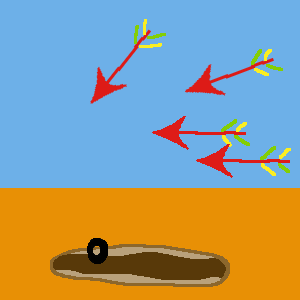
"You can protect yourselves", they were advised. But all who stood and looked up at the barbed volley, some wearing only underpants and saftey glasses, would drop into the foetal position, knead the sand with their hands and cry out invocations to their mothers (or god).
Thursday, September 14, 2006
Tuesday, September 12, 2006
Sunday, September 10, 2006
Dumbfaitho Cogito Ergo ... ?
Steve Salerno, author of SHAM: How the Self-Help Movement Made America Helpless, has a bone to pick with empowerment gurus. Whether they be crusading about self-esteem based education, evangelising about "taking charge of one's health-care destiny" (and, as a bonus, eschewing traditional medicine), or sermonising to corporate success junkies about skills, productivity and "the future", their message is always the same: "a positive mental attitude will carry the day".
Salerno demurs:

Salerno demurs:
You cannot have a life plan predicated on the belief that everything is equally achievable to you, especially if that same message has been sold indiscriminantly to all-comers. In the grand scheme of things, knowing one's limitations may be even more important than knowing one's talents.

Thursday, September 07, 2006
Tuesday, September 05, 2006
Atom skerrick
I love a long draught of atmospheric music. Also of atmospheric words. Atmospheric animals (e.g. birds and some species of lhama). That sort of thing. Atmospheric food? ... maybe not. Too close to vomit. But now I'm wondering if there's such a thing as atmospheric being. Due to a series of drunken teenage rejections at the clenched hands of Tok H bouncers, I have a fear of St Peter. Well, an abstract fear actually, cos I don't believe he or his boss exist.* So if there is such a thing, notwithstanding wormy wind, it definitely isn't a soul.
Atmospheric being.
Atmospheric been?
Atmospheric bean?
Atmospheric bee?
That's it! Beans and bees! Pods and proboscises. Vines and hexagons. Perfectly atmospheric. And all natural.
* Mike Willesee recently confirmed this for me on Enough Rope -- waxing sentimental about the kiddies he spent time with in Sudan while proudly advertising the fact that a good shank of his $50m fortune will be ploughed into Sudanese-kiddie-saving projects such as the demystification of stigmata and the forensic testing of blood-stained blankets.
Atmospheric being.
Atmospheric been?
Atmospheric bean?
Atmospheric bee?
That's it! Beans and bees! Pods and proboscises. Vines and hexagons. Perfectly atmospheric. And all natural.
* Mike Willesee recently confirmed this for me on Enough Rope -- waxing sentimental about the kiddies he spent time with in Sudan while proudly advertising the fact that a good shank of his $50m fortune will be ploughed into Sudanese-kiddie-saving projects such as the demystification of stigmata and the forensic testing of blood-stained blankets.
Sunday, September 03, 2006
Saturday, September 02, 2006
Women in row 19.65 and How did he get in there?


(click to enlarge ... Massive apologies once again to Alberto Giacometti and also to Brett Whiteley ... and hello to all my pseudo-intellectual fantasies -- you know who you are. None of this would be possible without you. Thanks for believing in me. Thanks for being me. Mum? Oh god, I'm going to cry.)
Friday, September 01, 2006
Thursday, August 31, 2006
Wednesday, August 30, 2006
The story of the off-centred handle Part IV
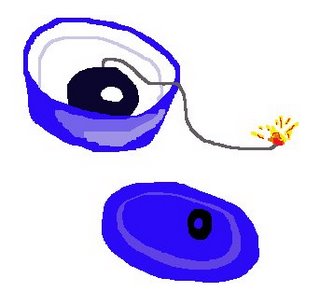
Some froze. Some ran. All were begged: "It's obvious isn't it?". But despite repeated assurances that no air meant no combustion, each person within range of the violent vindaloo, some with children and pets to protect, would wring their hands and gibberishly offer impractical solutions -- e.g. "Smother it with a slice of prosciutto", "Take a handful of rock salt and will it to end ", "Encourage that woman's dachshund to roll on it", and "Or lift its leg on it".
Monday, August 28, 2006
You're too late to get your supper
From the liner notes of Bruce Springsteen's joyously up We Shall Overcome -- The Seeger Sessions:
Old Dan Tucker
Old Dan Tucker was a fine old man
Washed his face with a fryin' pan
Combed his hair with a wagon wheel
And died with a toothache in his heel
Get out the way, Old Dan Tucker
You're too late to get your supper
Get out the way, Old Dan Tucker
You're too late to get your supper
Old Dan Tucker come to town
Riding a billy goat, leading a hound
The hound dog barked and billy goat
jumped
And landed old Tucker on a stump
chorus
Old Dan Tucker got drunk and fell
In the fire and kicked up holy hell
A red-hot coal got in his shoe
An oh my Lord the ashes flew
chorus
Now Old Dan Tucker came to town
Swinging them ladies all round
First to the right then to the left
Then to the gal that he loved best
chorus
repeat
Old Dan. Did he have any teeth not in his heel? Why the jostling in the soup queue? Is that what it was? I feel sorry for him. So he'd had a few. The man needed to eat for Christ's sake (probably). But he had a gal, I suppose, even if she only existed in the wooden world of square dance patter.
An antique fiddle tune, often used for square dances, made famous around 1843 when Dan Emmett, one of the greatest early minstrel singers, wrote a version of these lyrics for his group, the Virginia Minstrels.
Old Dan Tucker
Old Dan Tucker was a fine old man
Washed his face with a fryin' pan
Combed his hair with a wagon wheel
And died with a toothache in his heel
Get out the way, Old Dan Tucker
You're too late to get your supper
Get out the way, Old Dan Tucker
You're too late to get your supper
Old Dan Tucker come to town
Riding a billy goat, leading a hound
The hound dog barked and billy goat
jumped
And landed old Tucker on a stump
chorus
Old Dan Tucker got drunk and fell
In the fire and kicked up holy hell
A red-hot coal got in his shoe
An oh my Lord the ashes flew
chorus
Now Old Dan Tucker came to town
Swinging them ladies all round
First to the right then to the left
Then to the gal that he loved best
chorus
repeat
Old Dan. Did he have any teeth not in his heel? Why the jostling in the soup queue? Is that what it was? I feel sorry for him. So he'd had a few. The man needed to eat for Christ's sake (probably). But he had a gal, I suppose, even if she only existed in the wooden world of square dance patter.
The story of the off-centred handle Part III
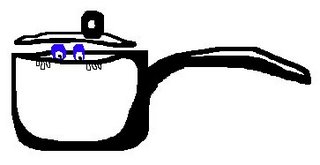
They were told that it wanted to escape and explore the kitchen. That there were two handles this time -- one little, one not. "The lid's handle. Take it between your fingers and lift", they were gently urged. "That's all you need to do. It'll hoist itself out when there's enough room". But each person who primed the stove would stand, some in contemplation of the concept of freedom, wipe sweat from their eyes and take another pan.
Friday, August 25, 2006
Too many kids with too many tellys
I read an essay recently called What About Me? The new narcissism by Anne Manne (The Monthly Jun 06). Here's a response (which, a la Alan Ramsey, includes hefty chunks of the author's text).
Did you know that "there is a TV set in the bedroom of most American children by the time they are in primary school"? Or that "more than half of all Australian children have a TV in their bedroom" and that "they spend more time in TV-viewing than any other activity"?
Manne introduces these facts following a discussion of how young peoples' sensibilities and inner lives are shaped. She wonders about the influence of a "predominantly visual culture" on this process. Her interest is more than philosophical given that her own country childhood was relatively unaffected by such a culture -- "we had no television at home until well into my teenage years" --, and that as a young woman her "consciousness, sensibility, sense of self and way of seeing were formed by a radically different view of the world, one embedded in [nineteenth century] novels". This literary engagement endowed her with a "moral narrative" through which she was able to see herself both "from the outside -- one's respect in the community -- and, more deeply, from the inside". It also awakened her to an important distinction between the authorial voice as accessed via a novel (where a special connection is made with the writer's inner life) and via a television program. She notes:
And what is preoccupation with the self but ... narcissism? Manne describes a strain of this affliction whose intensity goes beyond the "healthy" self focus and confidence most of us enjoy. She characterises the malignant narcissist as one whose
(If you've ticked any of these items, seek therapy NOW. But be warned: if you are a bone fide case, your de-narcissification may be very difficult. You will have to "spend a long time looking at the humiliated shadow lurking beneath [your] grandiose self-image". Also, it is most likely you will eventually subtlety undermine your therapist "by saying how bored [you] are with all this navel-gazing".)
The root cause of the lily pond malignancy is easily identified but far less easily understood:
In order to explain where this terror emerges from in the first place, Manne's analysis gets a little Freudian. She invokes such psycho-miscellany as emotional history (stored in the unconscious), the child-parent relationship and emotional regulation (specifically "conservation and withdrawal" as a reaction to manic upness, for example) to explain the abnormalities of the nascent narcissist toddler. Her description of the narcissist's emotional history is illuminating:
So how does all of this relate to the suggestion that in modern society "self-presentation is increasingly regarded as revealing the 'true' self"? If narcissism is just some statistical blip applying only to niche groups such as celebrities or Eastern suburbs property auctioneers, why all the psychobabble? Why all the theorising? Manne's conclusion is sobering:
All right kids, got the message? Too much TV means too much immersion in a value system that isolates you -- that is, the trim, tanned and popular SURFACE YOU -- as the centre of everything. And this is bad cos it'll almost certainly result in a long and dribbling descent into total inconsequence in some outer-suburban nursing home where your only visitor will be Mr Shuffles from the adjacent ward who urinates on your armchair and steals your mints.
Did you know that "there is a TV set in the bedroom of most American children by the time they are in primary school"? Or that "more than half of all Australian children have a TV in their bedroom" and that "they spend more time in TV-viewing than any other activity"?
Manne introduces these facts following a discussion of how young peoples' sensibilities and inner lives are shaped. She wonders about the influence of a "predominantly visual culture" on this process. Her interest is more than philosophical given that her own country childhood was relatively unaffected by such a culture -- "we had no television at home until well into my teenage years" --, and that as a young woman her "consciousness, sensibility, sense of self and way of seeing were formed by a radically different view of the world, one embedded in [nineteenth century] novels". This literary engagement endowed her with a "moral narrative" through which she was able to see herself both "from the outside -- one's respect in the community -- and, more deeply, from the inside". It also awakened her to an important distinction between the authorial voice as accessed via a novel (where a special connection is made with the writer's inner life) and via a television program. She notes:
The visual culture has extended and intensified the importance of the presentation of self in everyday life. Self-presentation is increasingly regarded as revealing the 'true' self. All this carries with it a reshaping of sensibility.
And what is preoccupation with the self but ... narcissism? Manne describes a strain of this affliction whose intensity goes beyond the "healthy" self focus and confidence most of us enjoy. She characterises the malignant narcissist as one whose
self has expanded so as to occupy all of consciousness. Whatever is good for the self is good. The malignant narcissist is prone to magical thinking about the grandeur of their life and achievements. It is all or nothing; mediocrity is not tolerated: never good, but always great. They posses an exceptional sense of entitlement, of being uniquely special. Often intensely competitive, they have to be superior to those around them. They can only be up if the people around them are down. They are often harshly critical of others, sometimes to the point of self-righteous contempt. But they are also prone to savage envy. Their arrogance means that taking responsibility for a wrong is impossible. The malignant narcissist is the captain on a ship of fools.
(If you've ticked any of these items, seek therapy NOW. But be warned: if you are a bone fide case, your de-narcissification may be very difficult. You will have to "spend a long time looking at the humiliated shadow lurking beneath [your] grandiose self-image". Also, it is most likely you will eventually subtlety undermine your therapist "by saying how bored [you] are with all this navel-gazing".)
The root cause of the lily pond malignancy is easily identified but far less easily understood:
We all know the story of Narcissus and how he fell in love with his own reflection, withering away by the lily pond, unable to move into life or relate to others, finally dying. But an excess of self-love is not, in any uncomplicated way, the problem with the narcissist. The narcissist is, in fact, an exceptionally shame-prone individual. The grandiose self-image is held up to defend against a central terror: that they amount to nothing at all.
In order to explain where this terror emerges from in the first place, Manne's analysis gets a little Freudian. She invokes such psycho-miscellany as emotional history (stored in the unconscious), the child-parent relationship and emotional regulation (specifically "conservation and withdrawal" as a reaction to manic upness, for example) to explain the abnormalities of the nascent narcissist toddler. Her description of the narcissist's emotional history is illuminating:
The first year is a time when, all going well, the dominant emotions of Your Majesty the Baby are very positive. By the beginning of the second year, as they learn to walk and move, toddlers feel elated at their newfound power. But pride, as the old adage says, goes before a fall. They fall down, break things, get fingers into light sockets and spill milk all over the floor. For the excited toddler there's a shouted prohibition every nine minutes, on average. It is very deflating. They are often humiliated and angry. Toddler-hood is also now recognised as the most aggressive period of any of the human life-cycle. Toddlers are filled with ambitions; without the skills to realise them they are also filled with shame. Every day they are spinning through the cycles of grandiosity and deflation faster than any manic depressive. It is hardly surprising, then, that they get rather pissed off at the whole thing and throw, from time to time, an almighty tantrum - nor that they require a lot of empathy, tact and sensitivity in handling. But at this time the toddler is also noted for a new and importantly human quality: sobriety. Although it's a wilder, bumpier ride than any at Luna Park, slowly they develop the ability to admit flaws in the self; and a related ability, to admit they have capacity to injure others.
It is extremely important that the small child gets help in toning down and pepping up, in being comforted and not excessively shamed. The narcissist has got through the Your-Majesty-the-Baby period nicely. Their problem is dealing with shame. Some have been too harshly shamed: subjected to shame so overwhelming that it cannot be acknowledged. In a mental conjuring trick, they create a perfect self of astonishing grandiosity, one who is always adorable, admirable, holding away the unbearable truth that, in reality, they were not seen as worth loving.
So how does all of this relate to the suggestion that in modern society "self-presentation is increasingly regarded as revealing the 'true' self"? If narcissism is just some statistical blip applying only to niche groups such as celebrities or Eastern suburbs property auctioneers, why all the psychobabble? Why all the theorising? Manne's conclusion is sobering:
By any historical standards, our society is marked by a radical individualism obsessed with the self. And it is a very particular self. It is a self on display, measured by externals and appearance, in pursuit of success and material prosperity more than care for others, of popularity and notice more than respect.
The problem is not just that the cult of self interferes with the good. It is that our values have shifted so far in favour of the ethos of narcissism that the pursuit of our self-interest now defines what we consider good. As [American sociologist Robert] Bellah concludes, "the only measure of the good is what is good for the self". And that, as a defining habit of the heart, is profoundly troubling.
All right kids, got the message? Too much TV means too much immersion in a value system that isolates you -- that is, the trim, tanned and popular SURFACE YOU -- as the centre of everything. And this is bad cos it'll almost certainly result in a long and dribbling descent into total inconsequence in some outer-suburban nursing home where your only visitor will be Mr Shuffles from the adjacent ward who urinates on your armchair and steals your mints.
370 incidents.
I first knew she was sick when I heard a sharp spurting noise behind me and saw clear liquid running past my feet. We were on the bus. The woman's face was red and convulsive. Her lips were glossy with saliva and maybe bile.
A passanger opposite the woman crossed her arms and, for the benefit of everyone, snapped "unbelievable!". Another passenger, a young woman, walked the length of the bus calling for a plastic bag. When one was eventually found and handed over, an atmosphere of concern (or for some I'm sure: pity) surrounded the distressed woman. I mentioned that the Prince of Wales hospital was only a few stops on. Then I spoke to the driver to make him aware of what he had probably already seen in his mirror. He was totally impassive; it felt like I was talking to a wall. Not wanting to judge but judging, I got off.
As I walked, the bus pulling away, I thought: for all the attention and fuss, that woman seemed in another place all together. She took the bag but not an offer of water. Her eyes rolled so as to avoid meeting anyone else's. Of course, it's possible she was a junkie, but who really knows, and besides should that change anything?
A passanger opposite the woman crossed her arms and, for the benefit of everyone, snapped "unbelievable!". Another passenger, a young woman, walked the length of the bus calling for a plastic bag. When one was eventually found and handed over, an atmosphere of concern (or for some I'm sure: pity) surrounded the distressed woman. I mentioned that the Prince of Wales hospital was only a few stops on. Then I spoke to the driver to make him aware of what he had probably already seen in his mirror. He was totally impassive; it felt like I was talking to a wall. Not wanting to judge but judging, I got off.
As I walked, the bus pulling away, I thought: for all the attention and fuss, that woman seemed in another place all together. She took the bag but not an offer of water. Her eyes rolled so as to avoid meeting anyone else's. Of course, it's possible she was a junkie, but who really knows, and besides should that change anything?
Tuesday, August 22, 2006
The story of the off-centred handle Part II

"Don't you want to know what 'generic' means?" they were asked. But each person who paused at the pot, some with fingers poised, would silently shake their head and move on.
Friday, August 18, 2006
The story of the off-centred handle Part I

People would look at the objects floating inside but flinch when asked to fetch one. The reason, the apology, was the off-centred handle.
Stupid stupid stupid poem
I can't let it out like this -
knotted, confused by itself,
uselessly tautlessly a thing
of play.
It. Tit. Titti.
Instead I'll send it on
to the 'vagaries'
where it might recoil
or reform.
knotted, confused by itself,
uselessly tautlessly a thing
of play.
It. Tit. Titti.
Instead I'll send it on
to the 'vagaries'
where it might recoil
or reform.
What, or who, is the 'something'?
Patrick White: 'Look into a passing bus, and more often than not you will see something you would rather not'.
I read this sentence on the bus this morning. I can't recall what happened immediately afterwards, probably nothing poetic or noteworthy, but it would have been cute, kind of symmetrical or something, if at the full stop I had lifted my eyes from the page to see an open-mouthed woman glaring at me from the passing pavement. It would have been even cuter if, shamed by our contact, she had then stooped sharply to gather her chaotic and billowy shopping bags and shuffled off into a throng of school kids.
I read this sentence on the bus this morning. I can't recall what happened immediately afterwards, probably nothing poetic or noteworthy, but it would have been cute, kind of symmetrical or something, if at the full stop I had lifted my eyes from the page to see an open-mouthed woman glaring at me from the passing pavement. It would have been even cuter if, shamed by our contact, she had then stooped sharply to gather her chaotic and billowy shopping bags and shuffled off into a throng of school kids.
A poem by Robert Adamson (1997)
The language of oysters
Charles Olson sat back in his oyster-shed
working with words - 'mostly in a great
sweat of being, seeking to bind in speed' -
looked at his sheaf of pages, each word
an oyster, culled from the fattening grounds
of talk. They were nurtured from day one,
from the spat-fields to their shucking,
words, oysters plump with life. On Mooney Creek
the men stalk the tides for corruption.
They spend nights in tin shacks
that open at dawn onto our great brown river.
On the right tide they ride out
into the light in their punts, battered slabs
of aluminium with hundred-horse Yamahas on the stern
hammering tightly away, padded high-tech -
sucking mud into the cooling systems,
the motors leave a jet of hot piss in their wakes.
These power-heads indicate
the quality of the morning's hum.
The new boys don't wake from dreams
where clinkers crack, where mud sucks them under,
their grandfather's hands fumbling
accurately, loosening the knots. Back
at the bunker the hessian sacks are packed ready
and the shells grow into sliding white foothills.
A freezing mist clenches your fingers,
the brown steam now cold as fire:
plunge in and wash away last night's grog,
in the middle morning, stinging and wanting
the week to fold away until payday.
On the bank, spur-winged plovers stroll in pairs,
their beak-wattle chipped by frost,
each day blinking at the crack of sun.
Stalking for corruption? Signs.
Blue algae drifts through your brother's dream
of Gold Coasts, golf courses. The first settlement.
Charles Olson sat back in his oyster-shed
working with words - 'mostly in a great
sweat of being, seeking to bind in speed' -
looked at his sheaf of pages, each word
an oyster, culled from the fattening grounds
of talk. They were nurtured from day one,
from the spat-fields to their shucking,
words, oysters plump with life. On Mooney Creek
the men stalk the tides for corruption.
They spend nights in tin shacks
that open at dawn onto our great brown river.
On the right tide they ride out
into the light in their punts, battered slabs
of aluminium with hundred-horse Yamahas on the stern
hammering tightly away, padded high-tech -
sucking mud into the cooling systems,
the motors leave a jet of hot piss in their wakes.
These power-heads indicate
the quality of the morning's hum.
The new boys don't wake from dreams
where clinkers crack, where mud sucks them under,
their grandfather's hands fumbling
accurately, loosening the knots. Back
at the bunker the hessian sacks are packed ready
and the shells grow into sliding white foothills.
A freezing mist clenches your fingers,
the brown steam now cold as fire:
plunge in and wash away last night's grog,
in the middle morning, stinging and wanting
the week to fold away until payday.
On the bank, spur-winged plovers stroll in pairs,
their beak-wattle chipped by frost,
each day blinking at the crack of sun.
Stalking for corruption? Signs.
Blue algae drifts through your brother's dream
of Gold Coasts, golf courses. The first settlement.
Wednesday, August 16, 2006
Monday, August 14, 2006
Friday, August 11, 2006
Pick the difference
From The Fontana Dictionary of Modern Thought.
life style.
(1) In psychoanalytic theory (see PSYCHOANALYSIS), an ADLERIAN term for a child's method, modified continuously throughout its life, of coping with feelings of inadequacy and of attaining superiority and STATUS.
(2) In popular usage, all the observable characteristics of a person, e.g. his manner of dress, way of speaking, personal appearance, domestic habits, and choice of friends, which serve to indicate his value system and attitudes towards himself and aspects of his ENVIRONMENT. These characteristics serve as a social signal to others, who react accordingly with feelings of trust, admiration, liking, etc., or the opposite.
life style.
(1) In psychoanalytic theory (see PSYCHOANALYSIS), an ADLERIAN term for a child's method, modified continuously throughout its life, of coping with feelings of inadequacy and of attaining superiority and STATUS.
(2) In popular usage, all the observable characteristics of a person, e.g. his manner of dress, way of speaking, personal appearance, domestic habits, and choice of friends, which serve to indicate his value system and attitudes towards himself and aspects of his ENVIRONMENT. These characteristics serve as a social signal to others, who react accordingly with feelings of trust, admiration, liking, etc., or the opposite.
Thursday, August 10, 2006
Subscribe to:
Posts (Atom)



